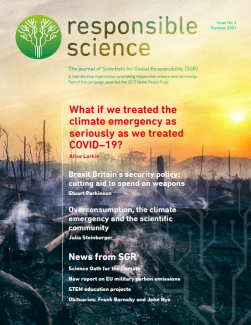Responsible Science is SGR’s journal in which we explore some of the biggest ethical challenges facing science and technology today. It comes with membership of SGR and keeps you up-to-date with what we’re doing as an independent, membership organisation made up of hundreds of natural scientists, social scientists, engineers and people who are simply interested. Contents include in-depth feature articles, reviews, and news on SGR's activities.
August 2021
Download pdf of the whole edition
To order a printed copy, please contact us
In issue no.3...
Feature articles
- What if we treated the climate emergency as seriously as we treated COVID–19?
Prof Alice Larkin, University of Manchester, argues that, if our society were really serious about tackling climate change, we would put much greater priority on social and economic change - as shown by the emergency response to the COVID-19 pandemic. - How a just transition can speed up the race to net-zero
Prof Nick Robins, London School of Economics, looks at the dynamics of a just transition away from fossil fuels. - Overconsumption, the climate emergency and the scientific community
Prof Julia Steinberger, University of Lausanne, explores how to live well within environmental limits, and
asks why questioning overconsumption is so problematic. - Hidden military implications of ‘building back’ with new nuclear in the UK
Dr Phil Johnstone and Prof Andy Stirling, University of Sussex, reveal key evidence on the unwelcome institutional links between civilian and military nuclear technologies. - From arms, planes and racing cars to ventilators: industrial conversion during the COVID-19 crisis
Dr Stuart Parkinson, SGR, assesses the UK’s crash industrial programme to scale up production of medical ventilators during the pandemic – and what lessons can be learned for conversion away from fossil fuels and arms. - Hacking the Earth: what could go wrong with geoengineering?
Prof Bill McGuire, University College London, assesses the risks of deliberately interfering with the climate system. - The potential for rapid transition of the aviation industry after COVID-19
Dr Lucy Gilliam, Transport and Environment, looks at the steps that need to be taken to prevent a resurgence of the aviation sector as we emerge from the pandemic. - Early sparks: tales from the history of renewable electricity
Dr Alice Bell, Possible, outlines some of the early history in the development of hydropower
and solar-power. - Lessons from the campaign to end big oil sponsorship of culture
Jess Worth, Culture Unstained, reflects on the successes of, and obstacles to, the campaign to end
fossil fuel sponsorship of art organisations and museums. - “Catastrophic moral failure” of vaccines not reaching the poorest
Andrew Simms, SGR, describes the UK’s great aid betrayal, and the international moral failure of pandemic vaccines not reaching the world’s poorest. - Brexit Britain’s security policy: cutting aid to spend on weapons
A string of announcements over the past year have set out Britain’s security and defence priorities in the wake of Brexit. These show an emphasis on high tech military equipment such as robotic and nuclear weapons, while the overseas aid budget is slashed and action on climate change remains inadequate. Dr Stuart Parkinson, SGR, assesses the situation. - Nuclear weapons are now illegal
On 22nd January 2021, the Treaty on the Prohibition of Nuclear Weapons (TPNW) became part of international law. Dr Philip Webber, SGR, examines the implications of this new UN treaty. - Are UK universities being drawn into developing autonomous weapons?
The UK government refuses to support a treaty to regulate lethal autonomous weapons systems, preferring instead to expand military R&D, including at universities. But, argues Leyla Manthorpe Rizatepe, Amnesty UK, these same universities could become a further focus of protest. - UK space ports: supporting the further militarisation of space
Prof David Webb, Leeds Beckett University, examines the links between the UK’s military and civilian space sectors. - Out of thin air: from gas boiler to heat pump
Following an installation in her home, Wiebina Heesterman explains how heat pumps – set to be an important alternative to fossil gas for home heating – actually work.
News from SGR
- Science oath for the climate gains more than 130 signatories
- New report on the EU’s military carbon emissions
- Britain’s accelerated militarism: SGR campaigning
- Other climate campaigning
- COVID-19 activities
- New staff
- STEM education projects
Obituaries
- Dr Frank Barnaby
- Professor John Nye
Event review
- SGR Online Conference: Transition Now
Book review
- Entangled life: How fungi make our worlds, change our minds and shape our futures
Letters
